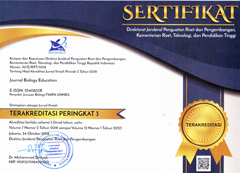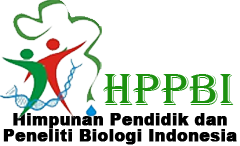Critical Thinking Ability, Cognitive Learning Outcomes, and Student Learning Activities in Excretion System Learning Using PBL-Based E-LKPD
Abstract
The aims of this study are : (1) determine the improvement of students' critical thinking skills in excretory system learning using PBL-based E-LKPD, (2) determine the increase in students' cognitive learning outcomes in excretory system learning using PBL-based E-LKPD, and (3) know the learning activities of students in learning the excretory system using PBL-based E-LKPD. This research is a Quasi Experiment research using a Non-Equivalent Control Group Design. The population in this study were all students of class XI IPA SMA N 2 Sragen. The sampling method is a purposive sampling; the research sample is students of class XI IPA 3, XI IPA 4, and XI IPA 5. The variables in this study consist of the independent variable, namely PBL-based E-LKPD, and the dependent variable is critical thinking ability and learning outcomes for cognitive learners. Data collection methods in this study were tests, observations, and questionnaires. The data in this study are the test scores for critical thinking skills, test scores for cognitive learning outcomes, the implementation of student activities, the implementation of learning, and student responses to learning. The data analysis technique used is descriptive statistical analysis (%) and hypothesis testing using the Independent Sample T-Test and Mann-Whitney U tests. The results of hypothesis testing the N-gain score on both variables show Sig. (2-tailed) <0.05, meaning that there is a difference in the improvement of critical thinking skills and students' cognitive learning outcomes between the experimental and control classes. Implementing student learning activities in the experimental class gave higher results than in the control class. The implementation of learning in each meeting reached a percentage of 85% with very good criteria. The response of students in the category of strongly agree and agree reached a percentage of 89.1%. The conclusions of this study are (1) increasing students' critical thinking skills in excretory system learning using PBL-based E-LKPD reaching the high category, (2) increasing students' cognitive learning outcomes in excretory system learning using PBL-based E-LKPD reaching high categories, and (3) the activities of students in learning the excretory system using PBL-based E-LKPD reached the very active category.
The copyright of the article once it is accepted for publication shall be assigned to the journal as the publisher. The intended copyright includes the right to publish the article in various forms (including reprints). The journal maintains the publishing rights to the published articles.
This work is licensed under a Creative Commons Attribution 4.0 International License.







